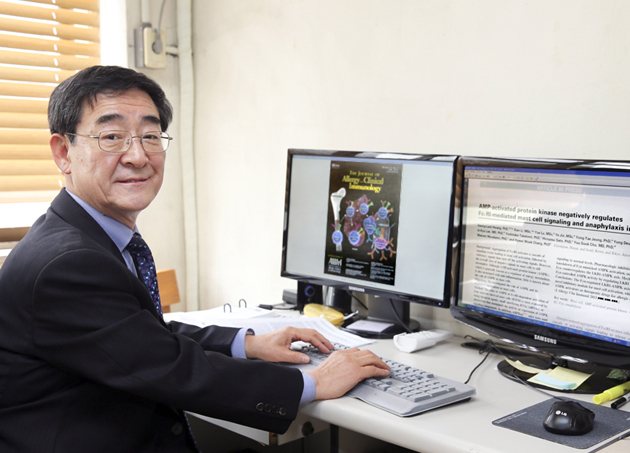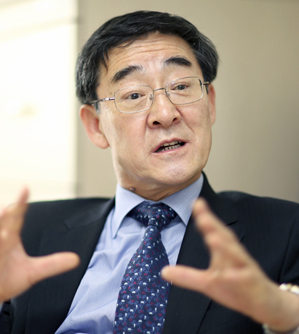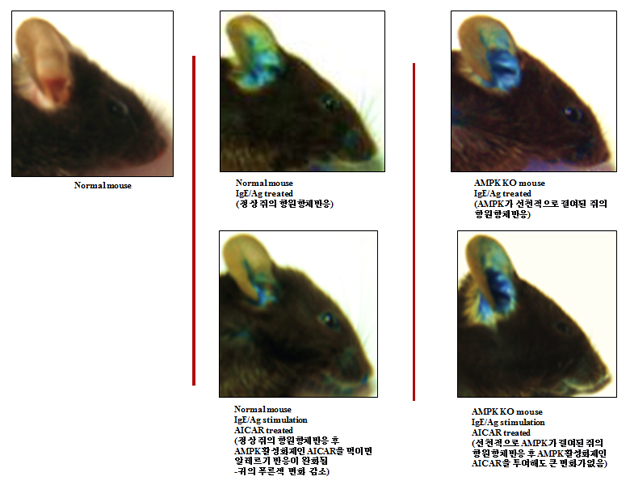Treat Diabetes and Allergic diseases at Once! N
No.88576- Writer YU
- Date : 2013.05.27 15:22
- Views : 31789
Professor Chang, Hyeun Wook at the College of Pharmacy suggests possibility to simultaneously treat metabolic and allergic diseases
His Thesis was published in the online edition of <Journal of Allergy and Clinical Immunology>
[April 24, 2013]
His Thesis was published in the online edition of <Journal of Allergy and Clinical Immunology>
[April 24, 2013]

Professor Chang, Hyeun Wook explains his research looking at the <Journal of Allergy and Clinical Immunology> in which his research is carried
Is there any way to treat the 'modern chronic disease' that interfere with the lives of modern people?
Professor Chang, Hyeun Wook (College of Pharmacy) suggested for the first time in the world the possibility to develop new drugs that can treat metabolic and allergic diseases simultaneously.
Professor Chang scientifically proved that by artificially activating AMPK (AMP-activated protein kinase), which is a sensor protein to maintain bodily energy homeostasis, it is possible to treat not only metabolic diseases such as type 2 diabetes, but also allergic diseases simultaneously through experiments with rats.
It has already been reported that when AMPK is activated, absorption of sugar and oxidization of fats in cells are promoted, which can treat metabolic diseases such as diabetes, obesity and fatty liver. However, Professor Chang's research was the world's first that revealed that AMPK activation can also suppress allergies and inflammation.
In particular, the result of this research is even more meaningful when considering animal test result of 'the higher blood-sugar, the more severe allergic reactions'. Through preliminary examinations, Professor Chang already gained results that allergic reactions were stronger for rats with high blood-sugar levels. This research also showed that compared to rats without having food consumption restrictions, rats with restricted food consumption had less allergic reactions. Because food consumption restriction is a condition for AMPK activation, it was interpreted that AMPK activation which has the effect on the suppression of the allergic reactions was proved.

The result of this research, which was carried out for about 3 years as part of the 'leading researcher support project' (core research) by the Ministry of Science, ICT & Future Planning (MSIP, Minister Choi Mun Kee) and the National Research Foundation of Korea(NRF, President Lee, Seung Jong), was published on the April 15 online edition of the SCI Journal, <Journal of Allergy and Clinical Immunology : JACI> issued by the American Academy, Asthma, Immunology. This journal is recognized as the world's top academic journal in the allergy sector with an impact factor (IF) of 11.
On this research, Professor Chang, said "There are many different causes and results for allergic diseases. Currently, over 30% of the global population and about 15-20% of the Korean population are reported to be suffering from allergic immune diseases. The problem is that it is continuously on the rise. Metabolic diseases are also on the rise due to westernized diets and lack of exercise." He added, "I hope that this research will help hasten the development of new drugs that can treat the chronic diseases of modern people, which are metabolic diseases and allergic diseases."
As follow-up research, Professor Chang is researching allergic reaction control mechanisms using the interaction of AMPK and AMPK inhibitory enzyme, while also studying the suppression effects of metabolic diabetes and allergic reactions by AMPK activators separated from natural materials. He hopes to obtain results from it soon.
<Test results of allergy and inflammation reaction for normal rats and AMPK congenitally deficient rats>

* * The larger and clearer the blue area on the inner part of the ear shows more severe allergy and inflammation reaction